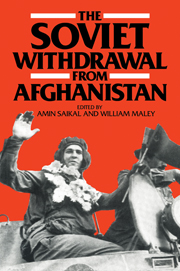Book contents
- Frontmatter
- Contents
- Preface
- 1 Introduction
- 2 The Geneva Accords of April 1988
- 3 Post-Withdrawal Afghanistan: Light at the End of the Tunnel
- 4 The Regional Politics of the Afghan Crisis
- 5 The Afghan Conflict and Soviet Domestic Politics
- 6 The Soviet Armed Forces and the Afghan War
- 7 Afghanistan and Soviet Alliances
- 8 Afghanistan and Sino-Soviet Relations
- 9 The Afghanistan 'Settlement' and the Future of World Politics
- 10 Conclusions: Management of the Afghan Crisis
- List of Contributors
- Index
7 - Afghanistan and Soviet Alliances
Published online by Cambridge University Press: 09 November 2009
- Frontmatter
- Contents
- Preface
- 1 Introduction
- 2 The Geneva Accords of April 1988
- 3 Post-Withdrawal Afghanistan: Light at the End of the Tunnel
- 4 The Regional Politics of the Afghan Crisis
- 5 The Afghan Conflict and Soviet Domestic Politics
- 6 The Soviet Armed Forces and the Afghan War
- 7 Afghanistan and Soviet Alliances
- 8 Afghanistan and Sino-Soviet Relations
- 9 The Afghanistan 'Settlement' and the Future of World Politics
- 10 Conclusions: Management of the Afghan Crisis
- List of Contributors
- Index
Summary
In contrast to the aftermath of the US withdrawal from Vietnam, which evoked a wave of speculation in both the US and its associated countries about an allegedly inevitable collapse of the global American alliance system, the pre- and post-Geneva period of the Afghanistan negotiations have seen a paucity of such speculation in the media of the countries that are the subject of this chapter. Direct consideration of the implications of the withdrawal has apparently been a taboo topic for the Soviet media and, evidently, for the media of its alliance partners as well, although there have been nuances of difference, as we shall see later on.
The approach of this chapter is first to present certain background factors of a theoretical and contextual nature; next, to distinguish among the various classes of Soviet alliance partners; and finally to look at the differential impact that the Soviet withdrawal from Afghanistan may have on the respective types of allies. Gorbachev's ‘new political thinking’ is presumably informed by a general desire to ‘wipe the slate clean’ in dealing with the outside world so as to maximise opportunities to pursue a more cost-effective set of policies at home and abroad in keeping with his perceptions of the structure and behaviour appropriate for a modern superpower in the age of the ‘scientific and technical revolution’. Bringing that desire to fruition is not an easy task, however, because of the structures, commitments and ideological presuppositions relating to Soviet foreign policy in general and the Soviet alliance system in particular which Gorbachev has inherited from his predecessors. Not even Gorbachev himself can be considered an entirely free agent in such matters.
- Type
- Chapter
- Information
- The Soviet Withdrawal from Afghanistan , pp. 101 - 121Publisher: Cambridge University PressPrint publication year: 1989



